SAEM Award Winners
SAEM24 Award Recipients
SAEM Organizational Advancement Award
The SAEM Organizational Advancement Award recognizes the tremendous amount of time, effort, and energy that this member has given and continues to give to the organization. Through thoughtful leadership, and selfless service, this member has greatly helped to advance academic emergency medicine through education and research, advocacy and professional development.
In 2024, SAEM is recognizing seven of our past SAEM Foundation presidents for their ongoing contributions in advancing our organization and academic emergency medicine.
Outstanding Department Award for Excellence and Innovation in Diversity, Equity, and Inclusion

University of California San Francisco (UCSF) Department of Emergency Medicine
UCSF Department of Emergency Medicine is a living and breathing example of diversity, equity, inclusion, and justice interwoven into all aspects of the departmental operations. DEI is our true north and informs the way that we approach leadership, clinical service, education, research, and community outreach. We have made great efforts to make structural changes and focused investments to advance diversity, equity, inclusion and justice.
John Marx Leadership Award
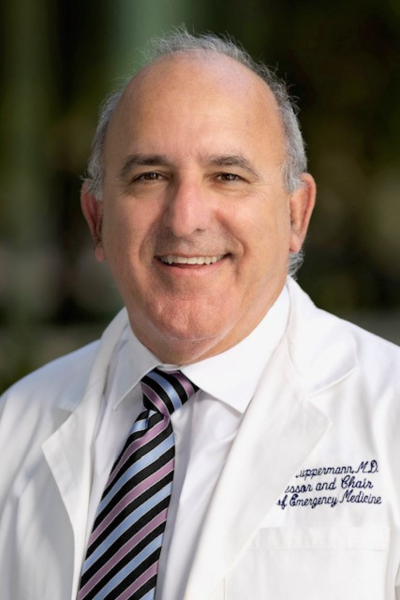
UC Davis
Dr. Kuppermann is a Distinguished Professor of Emergency Medicine and Pediatrics, and the Bo Tomas Brofeldt Endowed Chair of the Department of Emergency Medicine at UC Davis, and the Associate Dean for Global Health at UC Davis Health. He is a pediatric emergency medicine (PEM) physician and clinical epidemiologist, and a leader in emergency medical services for children, particularly in multicenter research. His focus is on clinical trials and clinical prediction rules using large cohorts of acutely ill and injured children. He has published works in all three focus areas in high-impact journals such as the New England Journal of Medicine, JAMA, BMJ, and The Lancet. Dr. Kuppermann has received more than $50 million in federal grants and contracts as a principal investigator (PI) or co-PI and has published 310 peer-reviewed research publications (Hirsch Index 75) in addition to many chapters and other publications. He has been a leader in multicenter research in PEM, starting by chairing the first U.S. research network in PEM (the Pediatric Emergency Medicine Collaborative Research Committee of the AAP) from 1996-2000. He then became the founding Chair of the Pediatric Emergency Care Applied Research Network (PECARN) since its inception in 2001 until late in 2008 and remains one of the seven network PIs. He completed a four-year term as Chair of the Executive Committee of the (global) Pediatric Emergency Research Network (PERN) and continues as a leader in PERN.
Dr. Kuppermann has been recognized nationally and internationally for his research and mentorship with many awards. In 2017, a PEM Scientific Research Mentoring award was named after him at the Society for Academic Emergency Medicine (SAEM), and in 2020 he was awarded the UC Davis Hibbard Williams Extraordinary Achievement Award and the Faculty Distinguished Research Award, the most prestigious awards at UC Davis. He was a Fulbright Distinguished Scholar in the U.K. and in 2010 was elected to the National Academy of Medicine. In 2022, he was the recipient of the Maureen Andrew Mentor Award from the Society for Pediatric Research.
Excellence in Research Award
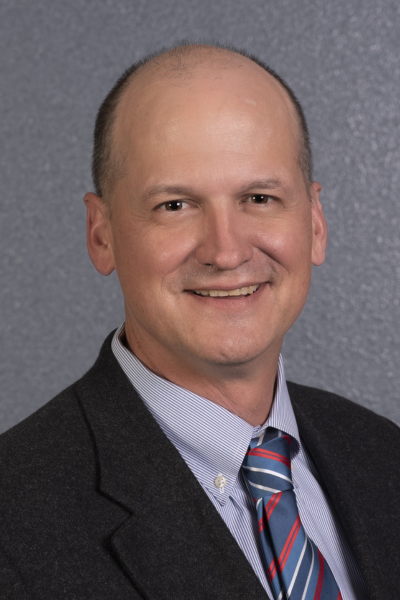
UC Davis
Dr. Holmes is a Professor and Executive Vice Chair in the UC Davis Department of Emergency Medicine. He is an emergency medicine physician and clinical researcher. His research is primarily focused on the initial evaluation of injured patients with a
special focus on injured children. His research has been highly cited and published in high impact journals including JAMA, The Lancet and The New England Journal of Medicine. Dr. Holmes has additionally devoted much of his career to mentoring junior
investigators. In 2006, he started the UC Davis Emergency Medicine Research Fellowship. He was Co-Director of the UC Davis Emergency Medicine K12 Research Training Program and in 2013 he became the Director of the UC Davis Clinical Translational Science
Center’s KL2 Research Training Program. Over his career he has received $20 million in NIH grant funding as principal investigator for both his studies on injured children and research training programs that he directs. Finally, Dr. Holmes
has been heavily involved in the Society for Academic Emergency (SAEM) during his career. He has served on both the SAEM Research and Grants Committees (Chair 2011-2013). Finally, he served on the SAEM Board of Directors from 2013 –
2022, including as SAEM President from 2020-2021.
Hal Jayne Excellence in Education Award
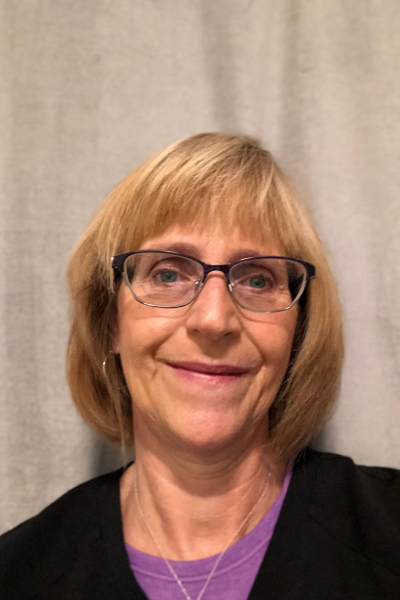
Yale University
Dr. Jubanyik is associate professor and attending physician in the Department of Emergency Medicine at Yale New Haven Hospital and Yale University. She completed her undergraduate education at Brown University in psychology and completed a Post-Baccalaureate Pre-Health Program at University of Pennsylvania, prior to enrolling in Yale School of Medicine. She has always had an interest in education, beginning with patient education. As a resident, she worked with C. Everett Koop, the former surgeon general of the United States, to develop novel ways of providing accessible patient education materials for a wide variety of public health issues, including hypercholesterolemia, diabetes mellitus, back pain, obesity and hypertension. In the COVID-19 era, she wrote and published a book for lay-people about the public health implications of the new virus, including the importance of testing, masking, and contact tracing.
Dr. Jubanyik has held multiple educational leadership roles in the department, including Associate Residency Program Director, Clerkship and Elective Director and since 2008, has been one of six academic advisors in the medical school, responsible for providing longitudinal support, advising, and career counseling to approximately 100 medical students. She is a co-leader for the first year Professional Responsibility course. She also teaches dozens of workshops to medical students every year, as well as simulation at all levels of the curriculum. As a faculty member, she developed additional training and expertise in palliative and end-of-life care, as well as professional ethics. She also serves on the Yale-New Haven Hospital Bioethics committee. Collaborating with others in the medical school and hospital, she participated in creating a triage protocol and led a team to evaluate whether the protocol would result in disparities based on race, ethnicity, or payer status as well as a mixed methods study to investigate provider attitudes and experience with the protocol.
With medical students and residents, as well as junior faculty, she has worked on numerous community-based participatory research groups to develop and evaluate programs to improve the care of vulnerable patients. She has led programs for emergency department identification of intimate partner violence and to improve the care of sexual assault survivors who present to the emergency department. She was co-investigator in a study funded by NIA/NIH, using community-based participation to develop a novel program to encourage elderly persons to report elder mistreatment using an ipad-based education program. And she has worked with a former Yale resident, now junior faculty member, to work with local stakeholders to improve the identification of homeless patients, assist in their care while in the department and improve continuity of care after their visit.
Marcus L. Martin Leadership in Diversity and Inclusion Award
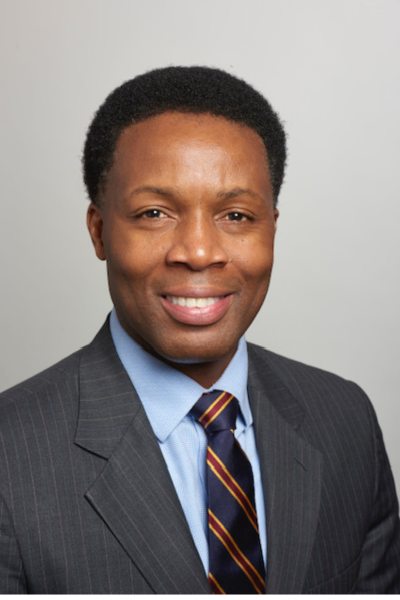
Mount Sinai Health System
Dr. Ezenkwele is Chief of Emergency Medicine at Mount Sinai Queens and Professor of Emergency Medicine at the Icahn School of Medicine at Mount Sinai. He is the Emergency Medicine System Vice-Chair for Diversity, Equity and Inclusion. He received
both his degree in medicine and in public health from John Hopkins University School of Medicine. Subsequently, he was granted a William J. Fulbright award which ultimately led to the development of trauma and injury surveillance systems in the Caribbean.
He then went on to complete a residency program in emergency medicine at the Hospital of the University of Pennsylvania.
In addition to direct patient care, his clinical interests include emergency medicine management systems, diversity, equity
in medicine and health care information technology. He is passionate about optimizing the delivery of care to acutely ill patients and improving the experience of patients in the emergency room. Prior to joining Mount Sinai, he oversaw emergency room
clinical operations which led to improvements in patient satisfaction, a decrease in the time to be seen by a provider, and a decrease in the percent of patients leaving the emergency room before being seen by a provider. He has found that improved patient
care can be achieved through technology, including electronic health records, as well as through educating patients, hospital staff, and community physicians. Dr. Ezenkwele is committed to the goal of helping to create a system of seamless coordinated
and integrated care for patients.
Dr. Ezenkwele is engaging with members of the Queens community and educating them in regards to various topics such as injury prevention. He is also interested in issues surrounding sensitivity in health care
delivery to the culturally diverse population in Queens. He hopes that patient and community physician engagement will optimize the integration of patient care on both campuses of the hospital.
In 2021, Dr. Ezenkwele was recognized by
Crains New York as a Notable Black Leader and Executive (https://www.crainsnewyork.com/awards/notable-black-leaders-and-executives-2021).
He also received the Vituity Award in Executive Leadership.
Additionally, Dr. Ezenkwele has been the recipient of a number of other awards and recognition including the National Medical Association Excellence in Service Award, (2012 –
2014) and the Society of Academic Emergency Medicine Visionary Educator Award. He has authored several publications and has lectured on topics including injury prevention, health disparities and diversity in medical education. He is the past president
of the Emergency Medicine section of the National Medical Association. He was also president of the Diversity Interest Group (DIG) and ultimately, the vice chairman of the Academy of Diversity and Inclusion in Emergency Medicine (ADIEM) of the Society
of Academic Emergency Medicine (SAEM). In both these roles, he was dedicated to making policy and educational changes that have a lasting effect on the next generation of physician leaders and the communities they serve.
Dr. Ezenkwele is a councilor of the American College of Emergency Physicians (ACEP) and an oral board examiner for the American Board of Emergency Medicine (ABEM). He is currently the chair of the ACEP Diversity Equity and Inclusion Committee.
As councilor and committee chair, he has authored several resolutions advancing health equity and increasing anti-racism sentiments including the creation of awareness around the detrimental effects of race-based science, education of vaccine efficacy
in communities of color and the hazards of chokeholds by law enforcement. Dr. Ezenkwele is passionate about equity in emergency medicine and is now working to make our professional organizations more inclusive.
Advancement of Women in Academic Emergency Medicine Award
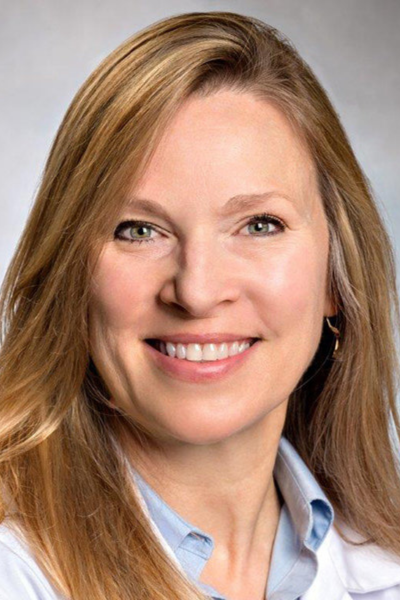
Brigham and Women's Hospital
Dr. Dobiesz is an associate professor and emergency physician at Brigham and Women’s Hospital (BWH) and core faculty at the Harvard Humanitarian Initiative (HHI). Dr. Dobiesz transitioned from the University of Illinois College of Medicine at Chicago to Harvard Medical School, and has dedicated her career to medical student, resident, and faculty education as well as the advancement of women in academic medicine. Her roles included Assistant Dean of Residency Preparedness, Emergency Medicine Simulation and Medical Education Fellowship Director, Director of Education for the Center of Global Health, Associate Program Director for Emergency Medicine. Her teaching efforts were recognized by the American College of Emergency Physicians’ National Teaching Award.
Dr. Dobiesz has presented over 200 national and 100 international invited lectures on emergency medicine, medical education and simulation, global health, women’s health, and wilderness and expedition medicine. She has co-edited a book on pediatric emergency medicine and co-authored over 60 book chapters and 40 peer reviewed publications. Dr. Dobiesz’s research focus is on improving care for maternal health and obstetrical emergencies. She is the principal inventor and is actively testing an obstetrical medical device designed by a multidisciplinary team to auto transfuse women suffering life threatening postpartum hemorrhage in low resource settings. She is also working to improve emergency obstetrical care provided by emergency physicians by standardizing training and enhancing continuing medical education activities. She recently served as the President of the Academy for Women in Academic Emergency Medicine (AWAEM) and leads research on the persistent gender inequities in the promotion and advancement of women and URiM in academic emergency medicine. Dr. Dobiesz currently she serves as the Director of the Frontline Indigenous Partners (FLIP) Program at BWH and HHI. The goals of this program are to improve Native American health through educational, clinical, and administrative partnerships. In this capacity she collaborates with tribal leaders developing multiple pathway programs for Indigenous youth to pursue healthcare careers to mitigate the current paucity of Native American healthcare providers and address persistent health disparities and health inequities.
Arnold P. Gold Foundation Humanism in Medicine Award
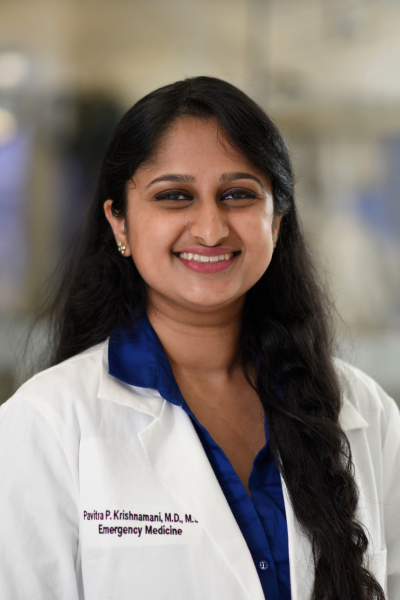
Pavitra Parimala Krishnamani, MD, MS
The University of Texas MD Anderson Cancer Center
Dr. Krishnamani is a faculty member at the University of Texas MD Anderson Cancer Center’s Department of Emergency Medicine. Having completed her residency in emergency medicine at Baylor College of Medicine and her fellowship in oncologic emergency medicine at MD Anderson, Dr. Krishnamani chose to pursue a career at the nation’s best cancer care hospital primarily because of her desire to care for and connect with patients at their most vulnerable moments. Her experiences have been shaped through her education as a fellow at both the University of Southern California’s Sidney Harman Academy of Polymathic Study and its Levan Institute for Humanities and Ethics. She thrives in her career because of her ability to communicate with patients from various walks of life and build strong bonds with her patients.
Dr. Krishnamani’s career has always been one of service and, throughout her education over the past decade, she has always focused on one question: “How can I give back to my community just a percentage of what I have?” A child of South Asian immigrants, Dr. Krishnamani was raised with principles of community service and was always taught to share her resources, whether this may be time, knowledge, or skills. Having grown up straddling two very different cultures, she earned a master of science degree in global medicine from the Keck School of Medicine of USC before pursuing her MD at Thomas Jefferson University. Her degree in global medicine equipped her to work with refugees in her community throughout medical school, first volunteering at several community clinics and then being selected to serve as a community clinic director. She gained joy from the little interactions she was able to have with various refugee communities in Philadelphia and was welcomed as a friend to many refugee community events. In 2015, she was inducted into the Carson Scholar's "Twenty Under Thirty" Hall of Fame for her work with refugees and migrant populations. She has since spoken about her experiences with refugee health and the importance of seeing patients as people first in forming strong physician-patient relationships built on trust.
Before graduating with her MD, Dr. Krishnamani also completed a fellowship in healthcare innovation at Jefferson's Digital Innovation & Consumer Experience group (DICE). As a fellow at DICE, she practiced clinical design, serving as a liaison between clinical work and innovation at Jefferson. She was a consultant for several large-scale initiatives at DICE, where she provided critical input into the design process to ensure projects enhance both patients' and providers' experiences. Most notably, she co-founded Jefferson's augmented reality/virtual reality Initiative and, in this capacity, leads one of the first studies in the U.S. examining how virtual reality (VR) can affect therapy and education in outpatient cardiac rehabilitation. She also spearheaded the initiative's first venture into product design, exploring how VR can help prepare providers for high-acuity clinical situations. As a core member of several other DICE projects leveraging VR and artificial intelligence, Dr. Krishnamani has been integral in cultivating relationships and activities that help further infuse digital innovation into clinical medicine at Jefferson. This experience taught her how to lead within a clinical enterprise and use her communication skills to design innovative solutions that are focused on patient and clinician needs.
A natural academic and educator, Dr. Krishnamani is a cited author and keynote speaker. She has continued to publish, present, and give interviews on her work in healthcare innovation and global health, speaking at conferences internationally and at several major U.S. universities. Most notably, she presented at Stanford's MedX and the VR & Healthcare Symposium at Harvard in 2018, the Society for Academy Emergency Medicine annual meeting in 2021, and South by Southwest in 2023. She has also published scientific research in collaboration with the University of Texas MD Anderson Cancer Center, Thomas Jefferson University, and the Amen Clinics, and presented research posters at Jefferson, UC Berkeley, and USC. Having previously served on the Board of Trustees of the American Medical Student Association (AMSA) and the The New Physician's student editor, Dr. Krishnamani is now a columnist with the American Academy for Emergency Medicine's Common Sense, where she offers first-hand insights into the life of a physician. Dr. Krishnamani continues to humanize her academic endeavors, with patient impact continuing to be at the heart of her research, writing, and presentations.
Public Health Leadership Award

Yale School of Public Health
Dr. Ranney is an emergency physician, researcher, and national advocate for innovative approaches to public health. In July 2023, she joined Yale University as Dean of the Yale School of Public Health, where she is also the C. E. A. Winslow Professor
of Public Health and a Professor of Emergency Medicine at the Yale School of Medicine. Her research focuses on developing, testing, and disseminating digital health interventions to prevent violence and related behavioral health problems, and on COVID-related
risk reduction. She has held multiple national leadership roles, including as co-founder of GetUsPPE during the COVID-19 pandemic and senior strategic advisor to AFFIRM at the Aspen Institute, focused on ending gun violence through a non-partisan public
health approach. She was previously the Warren Alpert Endowed Professor of Emergency Medicine, Deputy Dean of the School of Public Health, and Founding Director of the Brown-Lifespan Center for Digital Health at Brown University. She is an elected member
of the National Academy of Medicine, a Fellow of the Aspen Health Innovators’ Fellowship, and a member of the Aspen Global Leadership Network. She earned her bachelor's degree in history of science, graduating summa cum laude from Harvard University;
her medical doctorate, graduating Alpha Omega Alpha, from Columbia University; and her master’s degree in public health from Brown University. She completed her residency in emergency medicine and a fellowship in injury prevention research at Brown
University.
Mentor Award
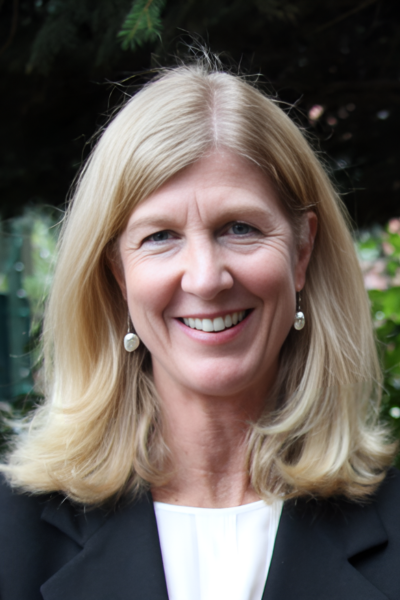
Stanford University
Dr. Smith-Coggins graduated from Cornell University with a BA, University of Pennsylvania with an MD and Northwestern University with board certifications in emergency medicine and internal medicine. She has been on the faculty of Stanford University from 1987 to present and has focused her efforts on medical education. In 1990, she wrote a successful ACGME application for an emergency medicine residency and served as the first residency program director at Stanford for 12 years. Dr. Smith-Coggins has mentored over 100 EM residents, continuing the relationship into their junior and even senior faculty years for several individuals. She was one of the first members of the SAEM Council of Residency Directors (1990) and remained an active member for 25 years. She often mentored other program directors and served on several committees. Through this work, she was nominated for and served on the ACGME Emergency Medicine Residency Review Committee from 2001-2007. They were able to successfully usher in duty hours regulations and mandatory sleep rooms or rides home for EM residencies during this time. Dr. Smith-Coggins was nominated and became a member of the Board of Directors of the American Board of Emergency Medicine from 2007-2015 and is now a senior director. This role enables her to help ensure a high standard of care throughout the nation. She started the Stanford Simulation Fellowship in 2007 and served as the fellowship director mentoring nine fellows from 2007-2017. She also started the Physician Wellness Fellowship for Emergency Medicine in 2018 and has graduated two fellows since then. Dr. Smith-Coggins shifted to undergraduate medical education as her leadership focus and served as associate dean for Medical Student Life Advising at Stanford from 2006 to 2023. She started the Office of Medical Student Wellness with two full-time staff members in 2009, which was one of the first of its kind in the nation. She also started the Stanford School of Medicine Mental Health Team on the medical school campus with a psychiatrist and four therapists in 2019, which is also quite unique. They developed many programs including Ears for Peers which is a peer mentoring program.
Dr. Smith-Coggins’ research focus throughout her career has been on physician wellness. She initially studied the effect of night shifts on EM physician’s sleep, performance, and mood. After a decade of grant writing, researching and writing on this, she moved to other topics including resident duty hours, simulation of crises management training, chaplains’ support, return to work policy for resident parents, among other topics. Dr. Smith-Coggins has spent the last decade researching mistreatment of residents and medical students. She started and chaired the Stanford Respectful Educator and Mistreatment Committee to raise awareness of mistreatment in our medical communities and create an avenue for residents and students to report mistreatment in a way that will help avoid fear of retaliation. She created a curriculum on this, tested it, published it and presented the results at the Association of American Medical Colleges national meeting. Dr. Smith-Coggins has trained 17 mistreatment coaches from many departments to be able to mentor individuals in their departments who have been identified by students and residents to have offensive behavior or language. She has been an advisor to other institutions including Johns Hopkins, that are setting up mistreatment programs, as well. For 35 years, Dr. Smith-Coggins has been advocating for physician wellness from a time when it was often met with eye-rolling until now when it is recognized nationally as a key topic in medicine. She finds it very rewarding to have been a small part of this movement.
Mid-Career Investigator
FOAMed Excellence in Education Award
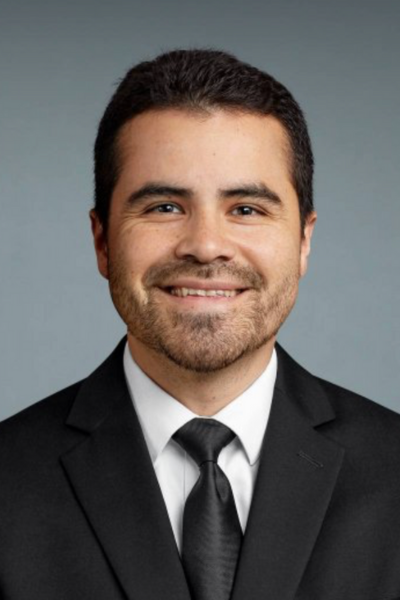
NYU Langone Health
Dr. Gilberti's trajectory in emergency medicine education has been marked by a series of progressive and influential educational roles, beginning with his time as a resident at Jacobi/Montefiore Medical Center. As an intern, Dr. Gilberti laid the groundwork for his educational path by founding the Jacobi/Montefiore Medical Center's educational website, a resource that has since become integral to the residency program. His innovative approach to curriculum development and active role in structuring resident education led to his appointment as Chief Resident, wherein he played a pivotal role in substantially enhancing the program's curriculum.
During the early stages of Dr. Gilberti's career at the Ronald O. Perelman Department of Emergency Medicine, he demonstrated an unwavering commitment to medical education, serving as Associate Program Director and leading the resident didactic conference programming. During this time, Dr. Gilberti became a Co-Editor-in-Chief of our department’s FOAMEd site (CoreEM), contributing heavily to both written and digital content, the latter of which is his current focus. Due to his exceptional efforts and productivity, CoreEM was recently cited as one of the most influential emergency medicine and critical care FOAMEd sites by digital impact factor (Lin M, Phipps M, Chan TM, Thoma B, Nash CJ, Yilmaz Y, Chen D, He S, Gisondi MA. Digital Impact Factor: A Quality Index for Educational Blogs and Podcasts in Emergency Medicine and Critical Care. Ann Emerg Med. 2023 Jul;82(1):55-65).
In his current work with Core EM, Dr. Gilberti continues to make an indelible mark on the field through the creation of compelling podcasts and video content. The podcast averages 45,000 monthly downloads in over 175 countries, while the CoreEM YouTube channel has attracted more than 4 million lifetime views from over 100 countries.
Early Investigator Award
Early Educator Award
Fellow, Resident, and Medical Student Awards
Fellow Award - Pediatric EM
-ibia-md.png?sfvrsn=a6f4d613_1)
Boston Children’s Hospital
Dr. Ibia is a Nigerian-born, American-raised, emergency medicine trained physician who specializes in the care of adult and pediatric patients in the emergency department. After completing his training in general emergency medicine at the Harvard Affiliated Emergency Medicine Residency (HAEMR) at Mass General Brigham, he began his pediatric emergency medicine fellowship training at Boston Children’s Hospital, while serving as a moonlighting attending at Massachusetts General Hospital and Brigham and Women’s Hospital. In all of these capacities, he provides clinical care, supervises trainees, conducts research, and strives to innovate to improve the care of pediatric patients in all emergency department settings.
Dr. Ibia's clinical interests and expertise revolve around pediatric emergency medicine infrastructure development in Southeastern Nigeria/Haiti and building tools to assist the general emergency medicine provider in caring for pediatric patients. Since his childhood, Dr. Ibia and his father (a pediatric infectious disease physician) have strived to build upon the marginal pediatric medical systems of their homeland. To this end, after his father's passing, Dr. Ibia created a non-profit organization in his father's honor called the Ekopimo Ibia Foundation, which focuses on promoting the provision of basic health services to the children of Southeastern Nigeria. Since its inception, the foundation has raised over $50,000 and provided the HPV vaccine to more than 300 young women in Calabar, Nigeria. Further, since the beginning of residency, Dr. Ibia has created tools to improve the care of pediatric patients in emergency department settings. These include being a significant contributor to an AHA-sponsored Pediatric Advanced Life Support smartphone app, co-creating a digital repository of Mass General Brigham Emergency Medicine protocols for life-threatening pediatric illnesses called Emergency Medicine Protocols, and becoming the web developer/content editor for Emergency Department SmartPhrases that can be accessed at https://medphrases.com.
Dr. Ibia has been actively involved in the on-shift teaching and supervision of medical students and residents since his senior years of residency, and this contribution has only increased since beginning fellowship and taking on moonlighting attending roles. He also regularly lectures the HAEMR residents on electronic medical record documentation optimization and pediatric specific topics with a general emergency medicine lens. Perhaps most importantly, Dr. Ibia has an inherent passion and commitment to sponsor ethnical underrepresented in medicine learners (especially Black men) to pursue careers in science and medicine. This is rooted in his belief that he would not be where he is today if he wasn’t blessed with similar mentorship during his early years. To this end, since his undergraduate years, he has served in multiple capacities including as a recess volunteer, afterschool mentor, tutor, teacher, invited speaker, and mentor. Many of Dr. Ibia's mentees have gone on to medical school and residency. He has also been privileged enough to be the co-founder of the residency diversity recruitment initiative that strives to create an environment where everyone can thrive, including the creation of the HAEMR Roots Bio-Book, a packet of brief biographies that highlight why many of the Black, Latinx, Women, LGBTQI+, and socioeconomically disadvantaged residents chose HAEMR for residency training. This initiative has been well-received throughout the Mass General Brigham system, resulting in a publication in the Massachusetts College of Emergency Physicians’ EM Advocate Newsletter in March 2019.
Since completing his training in general emergency medicine at the Harvard Affiliated Emergency Medicine Residency (HAEMR) at Mass General Brigham, Dr. Ibia has endeavored to provide excellent clinical care, careful administrative oversight, adaptable teaching, and tender mentorship, while striving to innovate to improve the care of pediatric patients in all emergency department settings. He is humbled and honored to have a career that allows him to combine these deeply ingrained passions.
Fellow Award - EMS
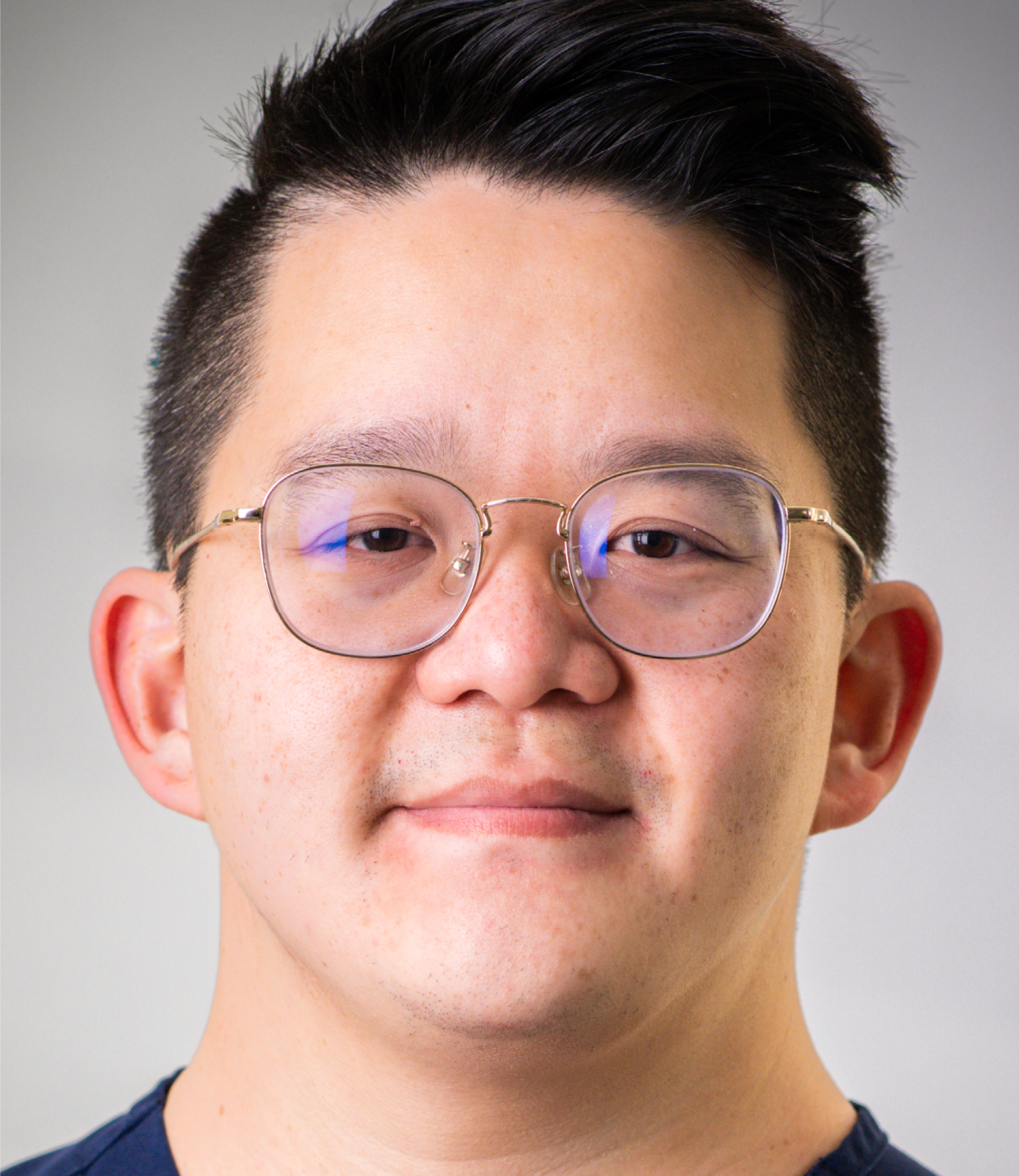
Yale University
Dr. Yang is a Yale Emergency Scholar (Research) and Emergency Medical Services (EMS) Fellow in the Yale University, Department of Emergency Medicine. He earned his BS in biomedical engineering and BSAS in electrical engineering from Washington University in St. Louis, his MD from LSU Health Sciences Center in New Orleans, and his MHS from Yale University. He recently completed his emergency medicine residency through the Yale Emergency Scholars Program.
Nationally, Dr. Yang has served as Mental Health Co-Chair for the Asian American Pacific Medical Students Association (APAMSA) and on the Equity and Inclusion Committee with the Society of Academic Emergency Medicine (SAEM). At the local level, he works closely with the sexual assault forensics committee and as an Interprofessional Longitudinal Clinical Experience (ILCE) mentor.
Dr. Yang's current research focuses on addressing disparities of care in three domains. First, he examines the discrimination that healthcare workers face in the clinical setting with a particular focus on Asian Americans. Second, he focuses on improving the quality of care that survivors experience after a sexual assault. Third, he examines health outcomes and prehospital service utilization among patients presenting with behavioral emergencies.
RAMS Leadership in Emergency Medicine Award

Trinity School of Medicine
Mr. Ettingoff is a medical student at Trinity School of Medicine, though completed the first two years of medical school at Tel Aviv University. He has been active nationally in emergency medicine since the start of his medical education, holding multiple leadership roles at the Society for Academic Emergency Medicine (SAEM), American College of Emergency Physicians (ACEP), and the National Association of EMS Physicians. His service in these roles is unprecedented as none of the roles were intended to be student roles.
Mr. Ettingoff has been active nationally in public health since before medical school and views his work in emergency medicine (EM) as a continuation of that interest and has fueled his passion for social EM, in particular. He has served in health departments on both the east and west coasts supporting a wide range of projects related to health equity, access to care, health communications, and building health systems more responsive to the needs of the public. He continues to consult on a number of projects around the country. He has and continues to serve in numerous leadership roles in the American Public Health Association and is currently standing for election to be chair of the APHA Injury Control and Emergency Health Services Section.
Mr. Ettingoff views emergency medicine as the ultimate safety net and perhaps the key intersection of medicine and public health. He has written about, spoken about, and worked on a number of topics related to social EM and EMS, particularly EMS-based mobile integrated health and community paramedicine programs. He has also served as an abstract and manuscript reviewer for these topics for several journals and conferences. With a particularly close relationship with Medical Care journal, he successfully launched a junior peer reviewer program introducing more than two hundred medical and graduate students to academic peer review and is working with the journal to develop a special issue for next year.
Even as a student, Mr. Ettingoff has initiated and led several national projects including the 2021 APHA Symposium on Health and Medical Misinformation which featured more than 700 participants and was instrumental in the emergence of several projects related to health misinformation. He has proposed and has championed the development of the first ever standards of care for health-related social needs in the emergency department and has championed the inclusion of social EM and EMS-based mobile integrated health in both emergency medicine and public health research and policy. He has also written several articles for SAEM Pulse, a chapter of EMRA’s Advocacy Handbook, and is in the process of writing a book for APHA Press.
Within SAEM Mr. Ettingoff has also led several research committee subcommittees on topics ranging from diversity and inclusion in research to reinvigorating how we showcase exceptional research, often bridging the gap between the research committee and the virtual presence committee where he leads the podcast working group. He has previously served on the SAEM program and ethics committees and has organized several sessions of the SAEM Research Learning Series, BioSketch podcast, and Who’s Who in Academic EM Podcast.
Despite his many involvements, Mr. Ettingoff has been very successful in the classroom, as well. Beginning with a bachelors in geography and emergency health systems, cum laude from George Washington, he continued on to complete his MPH while working in public health, a post-baccalaureate program at UC Berkeley, and complete his first two years of medical school at Tel Aviv University. While at TAU, Mr. Ettingoff served as class secretary for the first two years of medical school, during some extremely challenging adaptations to both COVID and conflict in the Middle East, completed a Certificate in Healthcare Quality and Safety from the Institute for Healthcare Improvement, and a Certificate in Business of Healthcare from the Wharton School/Penn Medicine, while also maintaining a 3.91 GPA and receiving several honors marks.
Mr. Ettingoff brings to his academic work a wealth of operational experience both tactically and strategically as an EMT, firefighter, rescue diver, aerial photographer, pilot, and incident management team planner and commander. He has led teams ranging from two to 2,000 on incidents ranging from simple medical emergencies to multistate hurricane responses and fires to national security special events. Mr. Ettingoff looks forward to completing his medical degree in the United States and hopes to continue into an emergency medicine residency and a career where he can serve clinically, operationally in public health and EMS, and continue to conduct research which furthers the interface of emergency medicine and public health. In the shorter term, he looks forward to continuing to champion minimum standards of care for social EM, to leading the development of “gold standards” for social EM, advocating for the expansion of EMS mobile integrated health programs, public health projects related to the implications of social media, and continuing his involvement with SAEM’s passionate committees and interest groups.
RAMS Excellence in Research Award
RAMS Excellence in Education Award
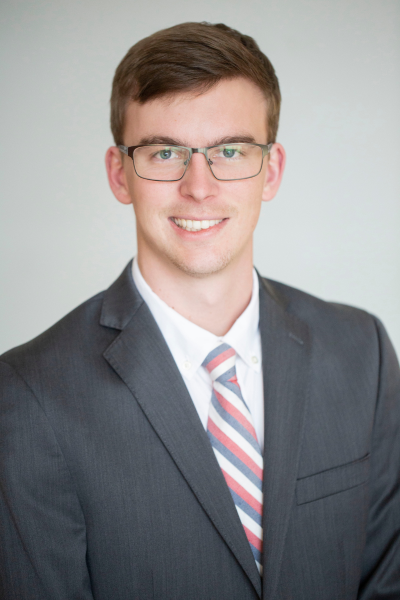
Brown Emergency Medicine
Dr. Martindale is a PGY-4 at Brown Emergency Medicine. In his three-and-a-half years as an emergency medicine resident, Dr. Martindale has held numerous leadership roles including medical education chief resident since 2022. He has worked with multiple faculty members on design and successful implementation of both research and quality improvement projects, including a campaign of teaching faculty and fellow’s placement of peripheral ultrasound-guided intravenous lines in the adult and pediatric emergency department, patient and staff safety initiatives, multiple residency curricula designs, and interdepartmental educational initiatives. He is a frequent guest lecturer at the Brown Warren Alpert School of Medicine and a mentor to several medical students. After residency, Dr. Martindale is poised to continue his career in academic medicine in a medical education fellowship with the intention of taking part in residency and medical student curriculum design.
Prior to his time in Rhode Island, Dr. Martindale attended medical school at the University of Arkansas in Little Rock, during which he was awarded the ACEP/EMRA National Outstanding Medical Student Award. In his spare time, Dr. Martindale enjoys all things outdoors, from gardening to dog training to backpacking and boating.
RAMS DEI Resident Education/Innovation Award
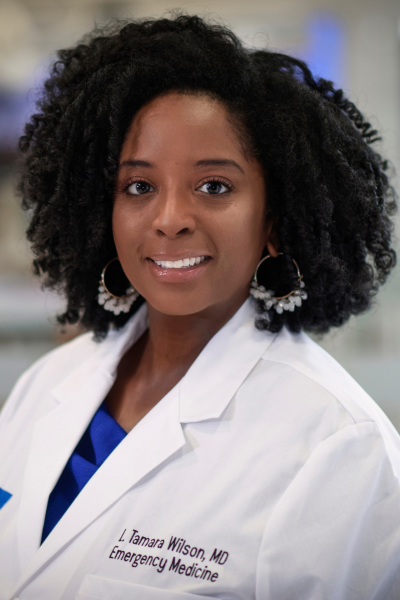
Baylor College of Medicine
Dr. Wilson, a chief resident physician in emergency medicine at Baylor College of Medicine is a fierce advocate for those at the margins of society and champion of diversity, equity, and inclusion in medical education. Dr. Wilson graduated from Duke University and received a bachelor of science in economics and a bachelor of arts in African and African-American studies. She completed her medical degree with honors in Gold Humanism at Georgetown University School of Medicine (GUSOM).
Espoused by her relentless passion for health equity, Dr. Wilson continually engages in service to communities in Houston, Texas, Washington, DC and abroad. Notably, she provided free preventive healthcare to underserved communities in the Dominican Republic through a medical student-run clinic which underscored how health literacy can improve an individual’s health agency and create better community health outcomes. She has served populations experiencing housing insecurity in Washington, DC through organizing a toiletry drive and volunteering at HOYA Clinic, a student-run free clinic, where she was recognized as a HOYA Clinic Student of the Month. She believes service to others is invaluable and has dedicated her clinical career to furthering this mission.
Prior to attending Georgetown, Dr. Wilson’s work in higher education at George Washington University sparked an interest in medical education, teaching, and mentorship. Through her role in curriculum management, she created quality educational outcomes and gained insight into the disproportionate number of underrepresented minority (URM) students and faculty in medical education. This empowered her to create solutions which improve student learning and increase representation. As a medical student, she furthered these interests as a medical education research track scholar by developing a longitudinal curriculum in diversity, equity, and inclusion. Additionally, as professional development facilitator for the Georgetown Experimental Medical Studies (GEMS) Program, a post-baccalaureate program for students from disadvantaged backgrounds, she created a curriculum which incorporates professionalism, mentoring, wellness, scholarship, and community engagement. Through this curriculum, she coaches GEMS students in their pursuit of medicine.
Dr. Wilson believes in cultivating a culture of representation, equity, and inclusion and is a leader among her peers. She created MedSTARS, a visiting clerkship program for URMs to improve institutional equity at MedStar Health and GUSOM. She served on the Office of Diversity and Inclusion Council on Diversity Affairs where she was engaged in efforts to increase the recruitment and retention of URMs. She has served in leadership positions including Georgetown’s Racial Justice Committee for Change, Taskforce on Curriculum and Student Wellbeing, and SNMA. She also chaired the ScholarRx Student Advisory Council, an international, student-led collaboration created to implement innovations in educational technology. Now she serves as chief resident of the Baylor College of Medicine Emergency Medicine Residency.
As a resident physician, Dr. Wilson is pursuing a career in emergency medicine with a health equity lens and aspires to become a dean of a medical school. While her interests are robust, her ultimate goal is to create a ripple of change by empowering institutions to challenge the way they think about health equity in medical education and healthcare delivery.
